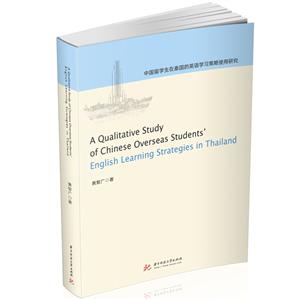中國留學(xué)生在泰國的英語學(xué)習(xí)策略使用研究 版權(quán)信息
- ISBN:9787568066587
- 條形碼:9787568066587 ; 978-7-5680-6658-7
- 裝幀:70g膠版紙
- 冊數(shù):暫無
- 重量:暫無
- 所屬分類:>
中國留學(xué)生在泰國的英語學(xué)習(xí)策略使用研究 本書特色
1、為我國留學(xué)生未來到非英語國家留學(xué)提供英語學(xué)習(xí)的方法借鑒。2、本研究所得出的相關(guān)理論以及教學(xué)實(shí)踐改革的啟示將有助于推動高校對適應(yīng)生態(tài)型社會、全球化以及“一帶一路”政策背景下的復(fù)雜文化交流背景的新一代人才培養(yǎng)的改革。3、有助于出國留學(xué)機(jī)構(gòu)有效建設(shè)、開展留學(xué)人員出國前的針對學(xué)習(xí)策略以及文化適應(yīng)方面的培訓(xùn)課程。
中國留學(xué)生在泰國的英語學(xué)習(xí)策略使用研究 內(nèi)容簡介
黃智廣,男,博士,五邑大學(xué)外國語學(xué)院講師。2010年至2011年就讀于泰國易三倉大學(xué)英語研究院,獲文學(xué)碩士學(xué)位,畢業(yè)論文研究方向?yàn)榈诙Z言自主學(xué)習(xí)者策略的動態(tài)性及社會文化因素影響。2012年至2017年在泰國易三倉大學(xué)攻讀哲學(xué)博士學(xué)位,研究方向?yàn)樯鷳B(tài)視野下的第二語言學(xué)習(xí)策略的動態(tài)性及復(fù)雜性。期間數(shù)次參加國際學(xué)術(shù)會議并做二語學(xué)習(xí)策略為主題的研究報告,以及在國際學(xué)術(shù)期刊發(fā)表相關(guān)論文數(shù)篇。2017年參加泰國朱拉隆功大學(xué)高級泰語學(xué)習(xí)班并獲結(jié)業(yè)證書。主要研究興趣為第二語言學(xué)習(xí)策略以及自主學(xué)習(xí)。
中國留學(xué)生在泰國的英語學(xué)習(xí)策略使用研究 目錄
Chapter 1Introduction/1
1.1Background/1
1.2Statement of the Problem/3
1.3Rationale/5
1.4Objectives/9
1.5Research Questions/10
1.6Significance of This Study/10
1.7An Outline of the Book/11
Chapter 2Literature Review/13
2.1Introduction/13
2.2The Ecological Shift in L2 Research/13
2.3The Complexity Theory Approach to L2 Research/15
2.4Terminology of L2 Learning Strategy (LLS) /20
2.5Definition of L2 Learning Strategy/21
2.6The Theoretical Bases in LLS Research/24
2.7A Conceptual Framework for the Study/34
Chapter 3Research Methodology/47
3.1Introduction/47
3.2Research Design/47
3.3Research Process/51
3.4Data Analysis/61
3.5Ethical Considerations/63
Chapter 4Findings and Discussion/65
4.1Introduction/65
4.2Participants’ Strategies for English Learning in China/66
4.3Participants’ Strategies for Learning English in Thailand/74
4.4Changes in the Participants’ Strategies for Learning English in Thailand/84
4.5The Factors Underlying the Changes of Participants’ Strategies for Learning English/122
4.6An Interpretation of Participants’ Strategies for Learning English Based on CT/173
Chapter 5Conclusion and Implications/181
5.1Introduction/181
5.2Summary of Major Findings/181
5.3Theoretical Implications/185
5.4Pedagogical Implications/186
5.5Limitations/189
5.6Suggestions for Future Research/190
5.7Conclusion/191
APPENDIX A/193
A Letter of Invitation/193
APPENDIX B/195
SemiStructured Interview Questions to be Piloted/195
APPENDIX C/198
Questions for the First SemiStructured Interview/198
APPENDIX D/201
Questions for the Second SemiStructured Interview/201
List of Tables and Figures/204
Glossary/205
References/206
A Qualitative Study of Chinese Overseas Students’
English Learning Strategies in ThailandCONTENTS
中國留學(xué)生在泰國的英語學(xué)習(xí)策略使用研究 節(jié)選
In this trend of international student flow, China, as a country with the largest population and rapid economic growth in the past four decades, plays an important role in outputting many overseas students and contributing economic profits to the host countries for these students. By 2008, the number of Chinese overseas students had surpassed that of any other country, accounting for 14% of the total number of international students in the world (Wang et al., 2009). In 2015, however, the figure rose further to 25% (Wang and Miao , 2016). This continuing trend of studying abroad among Chinese in the 21st century, compared with the last two decades of the 20th century, has shown a significant difference. In the past, only those with outstanding academic performance and professional qualifications had the opportunity to receive funding from the Chinese government for overseas education (Xue , 2011). Normally, they went to study in the traditional developed countries, such as the United States, the United Kingdom, Germany, and Japan, for the advancement in technology and ideology. Nowadays, as the “nation’ s gate” opens wider and the economy grows continuously, the Chinese people enjoy more freedom and possess stronger financial capacity in pursuing overseas education. Meanwhile, with the increasing frequency and popularity of global and cultural exchanges, Chinese people’ s interest in the oversea study destinations is no longer limited to the traditional developed countries.
中國留學(xué)生在泰國的英語學(xué)習(xí)策略使用研究 作者簡介
黃智廣,男,博士,五邑大學(xué)外國語學(xué)院講師。2010年至2011年就讀于泰國易三倉大學(xué)英語研究院,獲文學(xué)碩士學(xué)位,畢業(yè)論文研究方向?yàn)榈诙Z言自主學(xué)習(xí)者策略的動態(tài)性及社會文化因素影響。2012年至2017年在泰國易三倉大學(xué)攻讀哲學(xué)博士學(xué)位,研究方向?yàn)樯鷳B(tài)視野下的第二語言學(xué)習(xí)策略的動態(tài)性及復(fù)雜性。期間數(shù)次參加國際學(xué)術(shù)會議并做二語學(xué)習(xí)策略為主題的研究報告,以及在國際學(xué)術(shù)期刊發(fā)表相關(guān)論文數(shù)篇。2017年參加泰國朱拉隆功大學(xué)高級泰語學(xué)習(xí)班并獲結(jié)業(yè)證書。主要研究興趣為第二語言學(xué)習(xí)策略以及自主學(xué)習(xí)。
- >
伯納黛特,你要去哪(2021新版)
- >
經(jīng)典常談
- >
自卑與超越
- >
羅曼·羅蘭讀書隨筆-精裝
- >
月亮與六便士
- >
巴金-再思錄
- >
有舍有得是人生
- >
中國歷史的瞬間
















